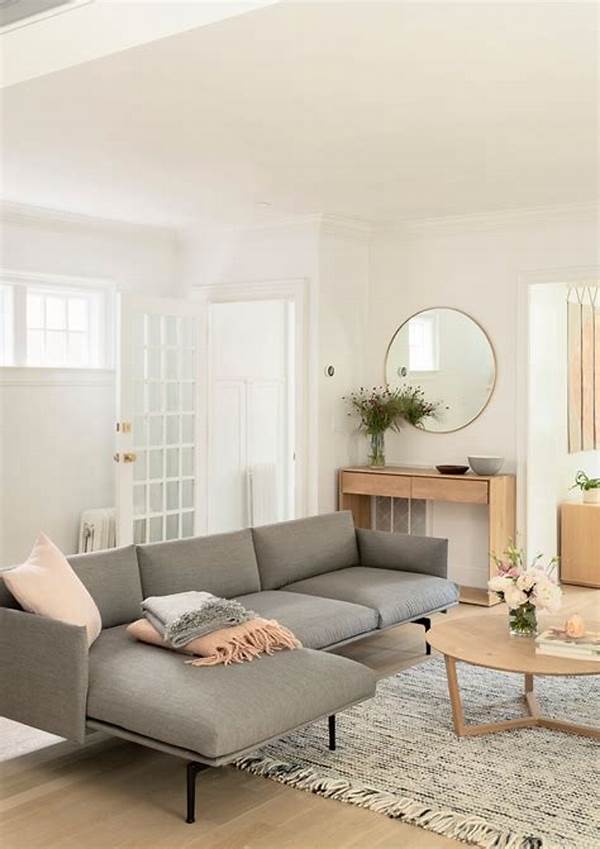How to Transition to Minimalist Living Smoothly
Read More : Top Minimalist Decor Stores Online
In today’s fast-paced world filled with consumerism, the yearning to simplify and declutter becomes more prevalent. Many are intrigued by the concept of minimalist living—a lifestyle promoting simplicity, clarity, and peace of mind. But transitioning to such a lifestyle can seem daunting. How does one let go of possessions accumulated over a lifetime? The process should be as smooth as silk, ensuring that those embarking on this journey do so with a sense of excitement and purpose, rather than dread. The ultimate aim is to find joy and contentment in the freedom that minimalism offers. But fear not, because learning how to transition to minimalist living smoothly is not just feasible, but can also be incredibly rewarding.
Imagine opening your closet and only finding clothes that you love, fit perfectly, and reflect who you are. Picture a living space that’s free from clutter, with each item having a purpose and meaning. Visualize the relief of not being tied down by superfluous possessions, allowing you to spend more time and energy on the things that truly matter. The transition to minimalist living is more than just an aesthetic change; it’s a transformation of the mind and soul. Embarking on this minimalist journey requires intention, dedication, and the willingness to embrace change.
While the concept might appear intimidating, it is, in fact, an empowering adventure that liberates one’s life from the chaos of excess. As you step into this new realm, you’ll discover a vast community of individuals who have already transitioned and are thriving. Listening to their stories, understanding their triumphs and challenges, and gaining insights will guide you through the process. With the right approach and mindset, you’re not just learning how to transition to minimalist living smoothly—you’re reclaiming your life from the bondage of too much.
Steps to a Successful Minimalist Transition
The first thing you need to realize is that becoming a minimalist doesn’t mean you have to live in a stark, white room with only a chair and a table. Everyone’s version of minimalism is different, and that’s okay. Some might focus on decluttering their homes, while others might seek to live more mindfully, cutting down on digital clutter or responsibilities that drain their energy.
The journey begins with a deep introspection and acknowledgment of why you want to adopt a minimalist lifestyle. Is it to reduce stress? To save money? Or to find more joy and purpose in everyday life? Whatever your reason, keeping this at the forefront will help guide your decisions.
From there, start small and gradual. Begin with one room or even a drawer. Assess each item not just on its utility but also on whether it brings you joy. Donate, sell, or recycle what no longer serves you—remember, there is no rush in how to transition to minimalist living smoothly. Celebrate each small victory, whether it’s a clutter-free kitchen countertop or a pared-down wardrobe.
—The Emotional Journey: How to Transition to Minimalist Living Smoothly
Adopting a minimalist lifestyle isn’t just about physical changes; it’s also about the emotional journey. Decluttering can bring up memories and feelings, especially when dealing with sentimental items. It’s okay to feel a pang of nostalgia or sadness—this is a natural part of the process and should be embraced.
To transition to minimalist living smoothly on an emotional level, it helps to focus on the future rather than the past. Ask yourself how this new lifestyle will positively impact your life moving forward. Keep a journal to document your thoughts and emotions, allowing you to see how far you’ve come and the benefits you experience over time.
The community aspect shouldn’t be underestimated. Engage with others who share similar values and goals, whether through online forums or local groups. Being part of a supportive network can provide encouragement, new ideas, and emotional support as you navigate this life-changing shift.
In conclusion, transitioning to a minimalist lifestyle is a personal and unique journey. It’s not merely about shedding physical belongings but also about fostering a mindset and lifestyle that values wellness, peace, and clarity. By following the steps and embracing the emotional aspects, you will not only learn how to transition to minimalist living smoothly but also create a life that truly reflects who you are.
Practical Tips: Finding Your Minimalist Path
. . . [Continued in next block for word count and formatting concerns]


